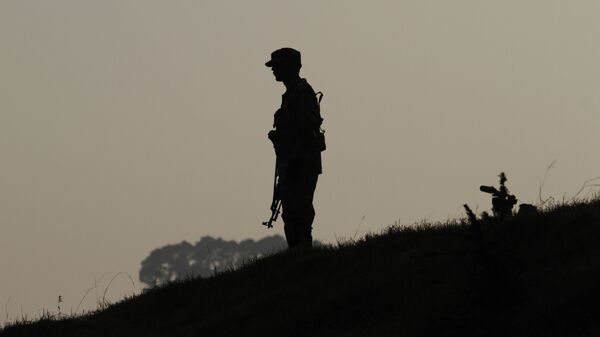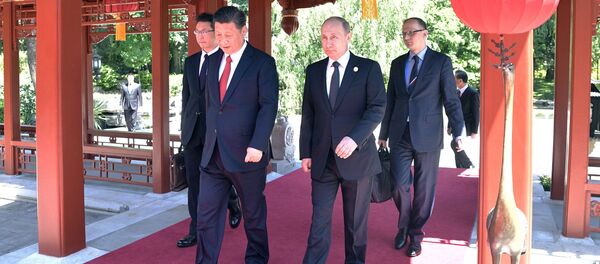New Delhi (Sputnik) — Qingdao, in east China's Shandong province, will be hosting the 18th Shanghai Cooperation Organization (SCO) Summit between June 9 and 10. The two acrimonious neighbors from South Asia, India and Pakistan, will be attending the summit as new inductees.
International relations expert Prof. Swaran Singh, in an interview with Sputnik, says that since India and Pakistan are already making efforts to re-set ties, the SCO would serve the best platform for resolving thorny issues between them. Prof. Swaran Singh is a professor at Jawaharlal Nehru University in New Delhi and also a senior fellow at The Charhar Institute in Beijing.
READ MORE: India Calls for Joint Action Against Terror Financing at BRICS Meeting
Sputnik: What is the significance of the upcoming SCO summit in China? What role is this group expected to play in the current geopolitical equation, especially new members India and Pakistan?
Prof Swaran Singh: First-time participation by India and Pakistan as new members of SCO — which made them part of all the preparatory meetings in the run-up to the SCO summit this weekend — has been a learning experience. This tectonic shift of SCO from Central to South Asia will be visible in about a dozen documents that will be adopted at their 18th summit as also in the much anticipated Qingdao Declaration.
Among its most visible results, the entry of these two South Asian neighbors makes the SCO the world's largest regional grouping that includes fast-growing economies with rapidly transforming societies. Together, SCO's eight member states represent half of the world's population and 20 percent of global GDP. With its four observers, six dialogue partners, and a growing number of special invitees and representatives from international institutions, the SCO has not just grown substantially but has also maintained its increased efficiency and efficacy across multiple sectors.
READ MORE: Modi-Putin Meet: India's Got Russia's Back in Latest Standoff With the West
With the leaders of its three key member states, Russia, China, and India, strengthening their personal camaraderie with 'informal' summits, SCO portends the redefining of the geopolitics of Eurasia and beyond. The guiding ideational force of SCO, i.e. the "Shanghai Spirit" that implies mutual trust, mutual benefit, equality, consultation, respect for cultural diversity, and the pursuit of common development — which sounds like new nomenclature to the Panchsheel principles of 1950s — provides a strong foundation for building complimentary partnerships among its members, including between India and Pakistan.
Prof Swaran Singh: Yes, there had been strong skepticism about the entry of India and Pakistan as full members of SCO. But their track record as observers since 2005 and the last year as full members have mitigated most such concerns about the negative impact of their contentious equations. Indeed, experts are now insinuating how their participation in SCO could unleash a series of positive outcomes for bilateral India-Pakistan relations. At the very least, multilateral forums, in general, have had a positive impact on contentious bilateral relations and SCO should be no exception. But given their shared national priorities of countering terrorism and energy security, the interest and experience of both India and Pakistan should not only make a valuable addition to the SCO celebration but also expect direct benefits from their initiatives and outcomes.
SCO Summit in Qingdao security is so intense that hotels only offer plastic forks and knives during the duration of the summit pic.twitter.com/jNPvKZCyeQ
— Ananth Krishnan (@ananthkrishnan) June 8, 2018
To give specific examples, terrorism has been the root cause of why India-Pakistan official talks have remained suspended for over five years. Last month, however, India sent a delegation to an anti-terror meeting of legal experts from the SCO's Regional Anti-Terrorism Structure that was hosted in Islamabad. This week saw military chiefs from the general staff of SCO member states meeting in Beijing, including India and Pakistan. Meanwhile, in the month of August, their militaries will be joining hands at SCO's biannual anti-terror drill, which is being hosted by Russia in sthe Ural mountains.
A preparatory meeting for this military exercise saw military representatives from the eight SCO members meeting in Moscow, which again included both India and Pakistan. All this will be surely be helpful in promoting India-Pakistan interactions.
READ MORE: Pakistan Actively Integrating into SCO Counterterrorism Actions
Sputnik: Can you elaborate upon the opportunity aspect for India and Pakistan with respect to the SCO?
Prof Swaran Singh: With the induction of India and Pakistan, SCO has come to be world's largest regional organization. It's goals of countering terrorism and ensuring energy security also are goals of India. After China, India has the second largest population and second largest but fastest growing economy in the SCO.
India can surely benefit from SCO in pursuing its national priorities of countering terrorism and ensuring energy security. Moreover, the last one year has seen China hosting over 120 meetings under SCO auspices that provided occasions for representatives from India and Pakistan, at various levels, having a first-hand interaction. This regular exposure surely is strengthening the constituencies favoring opening India-Pakistan talks. Already there are speculations in media that the new genre of diplomacy of 'informal' summits as seen in Wuhan and Sochi could be extended to Indian prime minister meeting next Pakistan prime minister after their general elections. There have been calls for India to meanwhile invite Pakistan Army Chief General Qamar Bajwa to India for talks.
Pakistani President Mamnoon Hussain said the Shanghai Cooperation Organization (SCO) is moving in the right direction and serves as a model of efficient and effective cooperation pic.twitter.com/QeJyriuyVe
— China Xinhua News (@XHNews) June 8, 2018
There is already a change in India's policy which has moved from "talks and terror cannot go together" to saying that "talks on terror" can surely be entertained. The Indian defense minister recently responded to Pakistani Army chief's proposal to restart talks when she said that India takes such offers "seriously" and this may open possibilities of at least backchannel talks between two National Security Advisors becoming formal and official talks. Such prognosis surely brings relief to their armed forces that have fought four wars since their independence and even today continue to face the threat of live shelling along the 1965 ceasefire line. But given their long history of conflict, the meetings between the two sides are likely to attract significant global scrutiny and skepticism.
Prof Swaran Singh: China is the most prosperous and influential member of SCO and it has set an ambitious pace for the developing of various SCO mechanism. As the host country, China is also naturally most ambitious to ensure maximum outcomes as it completes its presidency of SCO. Amongst expected documents may include an SCO Comprehensive Convention on Countering Terrorism. At least India sees this at its top priority and this will greatly boost India's own efforts at United Nations where New Delhi has been pursuing since 1996 a Convention on Countering International Terrorism which has now reached a drafting stage.
Also, all three key members of SCO — Russia, China, India — have been victims of terrorism and their BRICS summit last year had seen their consensus producing a detailed outline of their commitment in their Xiamen Declaration of September last year.
Speeding through the countryside at 300 km/h en route to Qingdao. The SCO security blanket has reached all the way to Beijing: travellers to Qingdao had to go through an unusual extra round of airport-style security screening (no aerosols), police marching up and down the train pic.twitter.com/kZqBzwE5j0
— Ananth Krishnan (@ananthkrishnan) June 8, 2018
Indeed, the role of Russia also needs to be underlined. Given India's deep engagement with the United States since 2005, New Delhi had not been very enthusiastic as an observer of SCO where it usually sent junior ministers like the minister for the environment. It was at the 2009 Yekaterinburg SCO summit that Russia had encouraged Indian prime minister Manmohan Singh to attend the meeting which marked an inflection point in India's engagement with SCO and BRICS. The last two years have especially seen Russia-China-India coming closer.
READ MORE: Russia, India, China Coming Together Against US – Indian Professor
Sputnik: How far will the issue of the menace of terrorism figure in the deliberations in the summit meet?
Prof Swaran Singh: Building an international consensus for countering terrorism remains the most important priority for India, in as much as most other members of SCO. Recent 'informal' summits at Wuhan and Sochi, where India Prime Minister Narendra Modi held one-to-one talks with President Xi Jinping and President Vladimir Putin saw them sharing their views on how to redress this enduring and formidable challenge to their security and development. India's prime minister will again hold the bilateral meeting with Russian and Chinese leaders this Saturday, only to carry forward their understandings on terrorism and other priority issues.
This is the first summit wherein India is participating with complete membership & so will Pakistan, terror will certainly be a substantial part of discussions: Gautam Bambawale, Indian Ambassador to China in #Qingdao on SCO Summit. pic.twitter.com/XwqDGZc5mH
— ANI (@ANI) June 8, 2018
Accordingly, the Qingdao summit this weekend is expected to adopt a clear plan of action for addressing specific threats stemming from terrorism in Afghanistan, which include the Islamic State, Taliban and Haqqani Network. India is not likely to name any countries, but only talk in terms of eliminating sanctuaries and funding, which the UN Security Council has already adopted for several resolutions. China's recent election as Vice-Chair of the powerful Financial Action Task Force (FATF) also raised hopes that increasing bonhomie among leaders of China, Russia, and India may be able to take some bold initiatives needed for addressing the enduring and formidable challenge from terrorism.
The views and opinions expressed by Dr. Swaran Singh in this article are those of the speaker and do not necessarily reflect the position of Sputnik.





